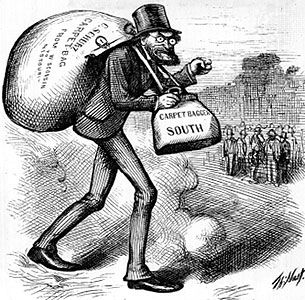'Calpetbaggers' Still Spiking Pensions
by CalWatchdog Staff | March 2, 2011 12:44 pm
 [1]MARCH 2, 2011
[1]MARCH 2, 2011
BY WAYNE LUSVARDI
Call them “Calpetbaggers.” They’re the 200 local governmental entities fingered in last week’s Little Hoover Commission’s pension report[2] that have defiantly increased public pension benefits since 2008 — in the face of a $240 billion shortfall in the 85 public pension systems in California.
The term is inspired by “fleebaggers[3],” given to the 14 state senators who have fled Wisconsin to deny a voting quorum in the state legislature on the issue of removing collective bargaining rights for public unions. Both terms derive from the word “carpetbagger,” for Northerners who went to the South after the Civil War to make money by exploitation.
The 200 government entities are notable in not being any of the bigger and more notorious scofflaws that have huge pension shortfalls, such as CalPERS, CalSTRS, the University of California System, or Los Angeles County. Instead, they are mostly small to medium sized cities, housing authorities, and special water, transit, parks, fire protection, air quality management, and flood control districts. The 200 cities, counties and special districts represent 13 percent of the total 1,500 participants in the Cal-PERS system.
Like the many redevelopment agencies around the state that are defiantly working to authorize huge bond issues in the face of Gov. Brown’s proposal to de-commission them, a significant number of local governments have “spiked” pension benefits apparently without media attention.
Conversely, the Little Hoover Commission reported that only 30 government entities lowered pension benefits for new hires, reflecting 2 percent of the total.
The Hoover report describes reckless pension systems statewide that invited mischief and abuse by pension “spiking.” This led to a compensation “arms race” among various cities and special districts, similar to the practice of redevelopment agencies using the model of a “horse race” between cities to justify their existence.
The Commission found that 200 local government entities have defiantly tried to “un-reform” public pension systems and that the public has the wrong impression from the media that such pension systems are being reformed. If economic conditions improve, the Commission warned that many local governments will reverse any reforms:
Despite the spotlight on pension reform today, nearly 200 public agencies have continued to boost retirement benefits since 2008. In the event of sustained stock market buoyancy, it is not hard to imagine that the pressure from employees will mount to un-reform any reforms being considered today, in order to boost pension benefits.
The Commission said that “public pension costs will crush government” and that increasing contributions and introducing a second tier of benefits for new hires will not be enough to reduce unfunded liabilities, especially for city and county pension plans. They add that the only way to manage such an unsustainable system is to curtail the benefits to current employees.
The Commission reported wasn’t the collapse of the financial market in 2008 that caused the shortfall in public pension plans. Rather:
the 2008-09 stock market collapse and housing bust exposed the structural vulnerabilities of California’s public pension systems and the risky political behaviors that have led to a growing retirement obligation for state and local governments, the scale of which taxpayers are just beginning to understand.
In sum, the conclusion of the Little Hoover Commission is that local governments can’t manage their own pension systems. Government, not markets, failed California taxpayers and public employees alike. The Commission recommended removing the authority of each local government to set benefits and to centralize the system in order to save it.
The problem is that the union-bought California legislators who created this debacle will control any pension oversight board, just as they are controlling the CalPERS board and the re-districting panel[4] authorized by Proposition 20. Calpetbaggers and gerrymanderers are all around, but no Teabaggers.
The Roman sage Juvenal asked, “Who will guard the guardians?”
Today, that’s: Who will bag the Calpetbaggers?
- [Image]: http://www.calwatchdog.com/wp-content/uploads/2011/03/Carpetbagger.jpg
- Little Hoover Commission’s pension report: http://www.lhc.ca.gov/studies/204/Report204.pdf
- fleebaggers: http://nation.foxnews.com/politics/2011/02/23/fleebaggers-new-cut-and-run-democrats
- the re-districting panel: http://www.flashreport.org/blog.php?postID=2011021409594149
Source URL: https://calwatchdog.com/2011/03/02/calpetbaggers-still-spiking-pensions/